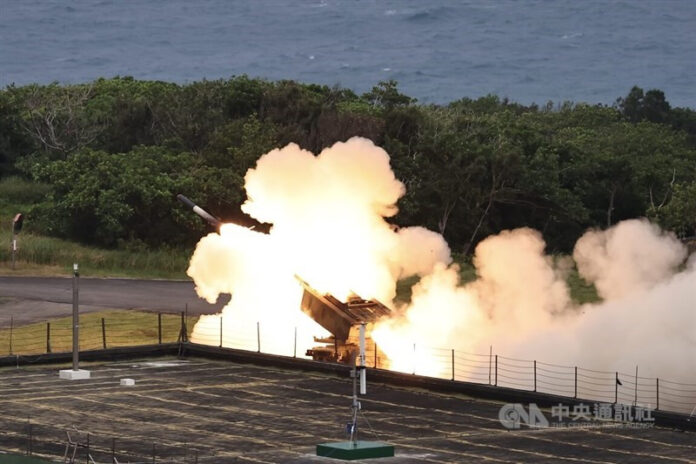In response to escalating concerns about potential Chinese electronic warfare targeting Taiwan’s newly acquired M142 High Mobility Artillery Rocket Systems (HIMARS), the Taiwan Army has clarified that two “signal anomalies” observed during a recent live-fire test were not caused by GPS jamming or signal interference from China. Instead, the disruptions were due to a fire control software glitch, according to Taiwan’s Army Chief of Staff, Chen Chien-yi (陳建義).
This statement was made during a Legislative Yuan hearing, where lawmakers raised questions about Taiwan’s preparedness against possible signal warfare amid rising tensions in the Taiwan Strait.
🧪 Details of the Incident:
On May 12, 2025, Taiwan conducted its first live-fire test of the HIMARS system at Jiupeng Military Base in Pingtung County, marking a significant milestone after receiving 11 out of 29 units ordered from the U.S. in October 2024.
- A total of 33 rockets were successfully launched.
- However, two instances of signal anomalies occurred during the firing command transmission.
- These anomalies triggered self-diagnostic alerts from the fire control computer system, temporarily pausing the operation.
Following standard U.S. military procedures, the operators reset the system and resumed operations without further incident.
💻 Root Cause: Fire Control Software Glitch
According to General Chen, post-test diagnostics and communication with the U.S. supplier revealed that the anomaly stemmed from a sporadic software issue, previously identified by U.S. military units and other international HIMARS users.
“The issue was not hardware-related or due to external electromagnetic interference but rather a software bug picked up by the self-diagnostic systems built into the HIMARS platform,” said Chen.
A software update is now scheduled to be implemented across the system to prevent future occurrences.
🌐 China’s Electronic Warfare Threat: Context & Concerns
The clarification comes amidst growing apprehension that Chinese forces could employ electronic warfare (EW) — including GPS spoofing, signal jamming, or electromagnetic pulse (EMP) weapons — to neutralize Taiwan’s advanced weapons systems in a conflict scenario.
Such concerns are not unfounded:
- A May 2024 report from The Washington Post, citing a confidential Ukrainian assessment, noted that Russian EW systems had rendered HIMARS “completely ineffective” in some instances.
- Reports indicated miss distances of over 50 feet due to jamming, though newer operational methods have partially mitigated the issue.
Given China’s rapidly developing electronic warfare capabilities, Taiwan’s military planners have been working under the assumption that their systems could be subjected to similar threats.
📡 Taiwan’s Electromagnetic Safeguards
Taiwanese military officials stated that the May 12 test was conducted under comprehensive environmental control protocols, including:
- Airspace and maritime clearance
- Electromagnetic spectrum monitoring
- Backup command systems
“No external electromagnetic abnormalities were observed during the test. The firing was conducted in a controlled, interference-free zone,” General Chen emphasized.
This underscores Taiwan’s proactive steps to prepare for cyber and signal-based warfare, making it harder for adversaries to disrupt their operations through electronic means.
🛡️ Strategic Importance of HIMARS in Taiwan’s Defense
The HIMARS system is a cornerstone of Taiwan’s evolving “asymmetric defense” strategy, which focuses on mobility, precision, and survivability rather than conventional force parity with China.
Key strengths of HIMARS:
- High mobility: Mounted on wheeled vehicles, can be rapidly deployed.
- Extended range: Up to 300 kilometers with precision-guided munitions.
- Interoperability: Seamlessly integrates with U.S. and allied targeting systems.
In the event of a conflict, HIMARS would be used to:
- Strike Chinese troop staging areas across the Taiwan Strait.
- Deter amphibious assaults by targeting ports and beachheads.
- Support counter-strike operations in coordination with allied forces.
The reliability of HIMARS is therefore strategically vital. While the recent software glitch is not considered a critical threat, it highlights the importance of real-time monitoring, system updates, and operator training to ensure continued performance under pressure.
🔍 Expert Analysis:
Military analysts suggest that this incident should be viewed not as a failure, but as a validation of the HIMARS self-diagnostic and fail-safe protocols.
“The fact that the system detected its own error, paused operations, and resumed safely following procedures is precisely how advanced military technology is supposed to function,” said a Taipei-based defense analyst.
Moreover, Taiwan’s transparency and collaboration with the U.S. in identifying and addressing the issue demonstrate a mature defense relationship and a rapid response capability that is crucial in modern warfare scenarios.
✅ Conclusion
While the HIMARS system experienced a hiccup during its debut live-fire test in Taiwan, the incident reveals more about its robustness than vulnerability. The system responded appropriately, the fault was identified, and remedies are being implemented swiftly. In an era of growing reliance on software-integrated warfare, such pre-emptive troubleshooting and transparent accountability are critical.
Taiwan’s defense against signal warfare remains a work in progress, but with continued U.S. cooperation and diligent systems testing, its strategic platforms like HIMARS will remain central to its deterrence capability.
🧾 FAQs
Was the HIMARS system hacked or jammed by China during the test?
No. The anomalies were due to a software glitch in the fire control system and not external jamming.
How many HIMARS units has Taiwan received so far?
Taiwan has received 11 of the 29 units it purchased from the United States.
Is HIMARS still reliable for Taiwan’s defense?
Yes. The system’s core functions remained intact, and the glitch was resolved using standard U.S. procedures. A software patch is underway.
Has the same problem been seen elsewhere?
Yes. Similar software issues have been identified by the U.S. military and other allied users of the HIMARS system.
Can Taiwan counter Chinese GPS jamming?
Taiwan employs electromagnetic shielding, encrypted communications, and strategic testing environments to minimize risk from EW threats.



